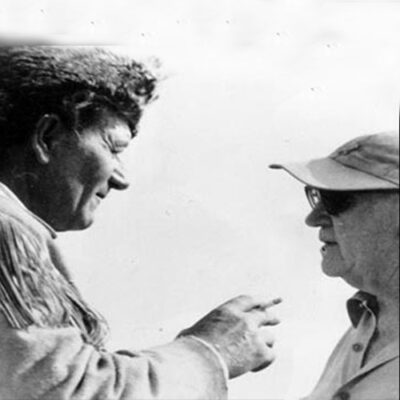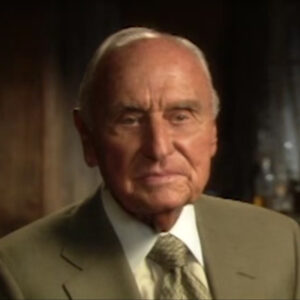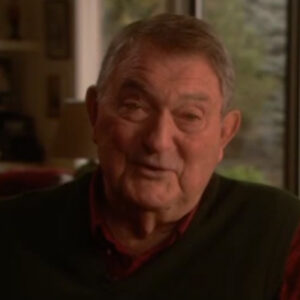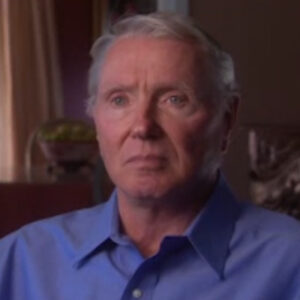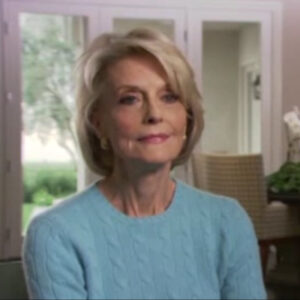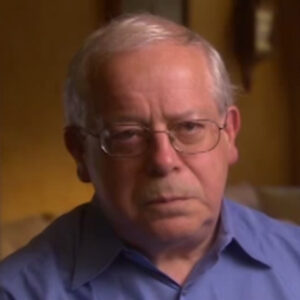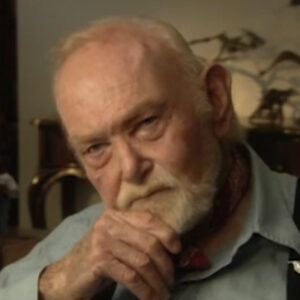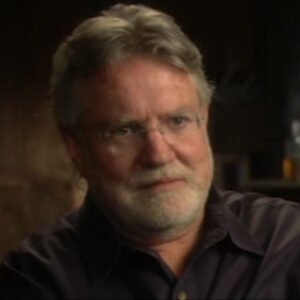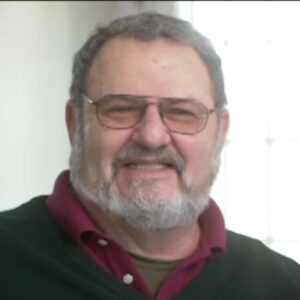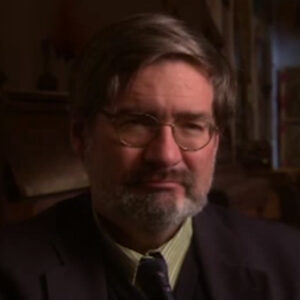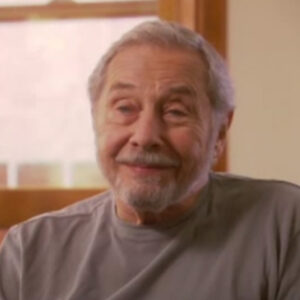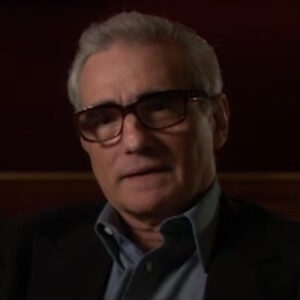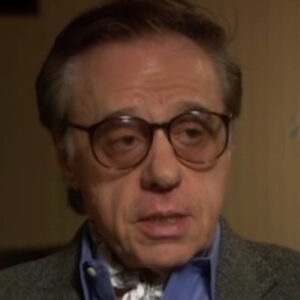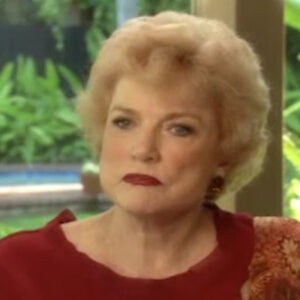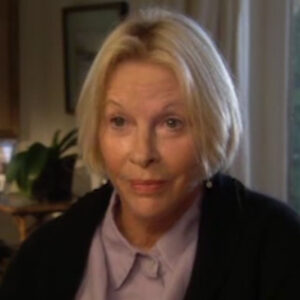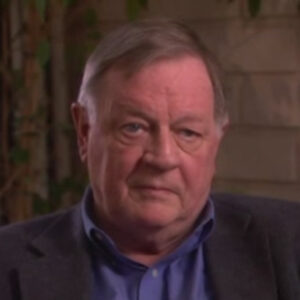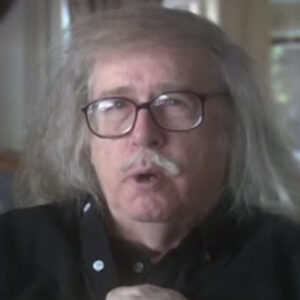Speaker I worked for John Ford and three pictures, I became like a member of his stock company and I did the horse soldiers, Sergeant Rutledge and the civil war sequence that he directed in how the West was won.
Speaker What was it like working with Forward by that time in his career? I was he was he was he was tough.
Speaker I had never met the man, but and I had only been in the business a short time, I, I, I got an audition, my agent said, you got an audition for John Ford for the horse soldiers.
Speaker And I thought, oh, my God, John Ford. So I go out there and I said, Do you have a script or some, you know, pages? And my agent said, no, they didn’t give me anything. So I figured, well, when I get to the office, I’ll give it to me. So when I get to the office, I said to the secretary, have you got to set a scene or something for me to read? She says, No, there’s nothing. You don’t have anything. I thought. Well, I guess it’s going to give me something or do an improvisation or something like that when I get inside, so when my turn came and I go in and John Ford’s in there, the producer was there and he had the chair where the prospective actors sat and right close to the desk and John Ford is sitting behind the desk. And Ford kind of grumbled something, sit down and I sat down. And I’m still waiting for somebody to give me a scene or something, and he says. You like horses?
Speaker And I said.
Speaker Yeah, yeah, yeah, I like horses. He says, How much do you like horses? I said, well, my father always had two horses on our property and I’ve been riding since I was three years old, you know, he said, so you really like horses? And I said, well, yeah, I’m like a OK.
Speaker Is OK. Thanks for coming in.
Speaker And I left and I thought, well, this is ridiculous. I called my agent, I said, forget that I’m not doing the horse soldiers. A couple of days go by. My agent called me his bill. You’re doing the horse soldiers. You’re going down in Louisiana. You’re going to be on the picture for ten weeks.
Speaker I thought, oh, my God.
Speaker So I go down there the first day and now we’re all staying, everyone staying at this hotel in Alexandria, Louisiana, except for the stars. Now, John Wayne and William Holden and Constance Towers and John Ford, they’re staying somewhere else. But all the other actors, stuntmen, everyone are in this hotel. So the first day they pick us up in buses and take us out to the location, beautiful location with a river, you know, and the trees and just a gorgeous place. And we get out of the bus and the old man comes over to us. And I thought, I guess we’re going to get a welcome, you know, a little welcome speech or pep talk or something. And he says.
Speaker There’s no actors in this movie is only writers.
Speaker You’re all horsemen, and he walked away, that’s all he said. OK, you know, well, practically every day since we arrived on the set, we got a ranger, gave us the reins to a horse. We got on him. We were on these horses all the time. But the same day I walked over because I always like to be somewhere near the director, somewhere near the camera, not not real close, but just because I like to watch everything and I’m just a kid, you know, I’m 21 years old and I’m standing maybe 50, 60 feet from from four. And he’s sitting in his director’s chair looking out across this river. His back is to me and I’m just so happy to be down there. And I got my cavalry outfit on and I’m just feeling really good. And I’m just all of a sudden all the work stops. John Ford swivels around, looks around at me, and I’m.
Speaker Stop whistling, everyone’s looking at me.
Speaker And then everyone turns when I stop whistling and went back to work before I turned back around, I thought, what the hell is? I walked over to somebody. I said, what’s going on? And this person said, Never whistle around the old man.
Speaker Don’t whistle, don’t laugh, don’t joke. Don’t sing unless he starts it.
Speaker So I thought, oh, my God. I said, well, I don’t know all the rules of this. I said, I’m going to stay away from him because I want to make it through this picture. So I kind of stay stay a little away from him and. He. People said he was like my old man, like my father, same kind of crusty old directors in this kind of thing, but actually there was a lot of differences, which is the Afghan people would say, yeah, I want people to know as well and a little bit, OK, why don’t you go on? OK, before I went down on the horse soldier’s location, people said to me, well, your father and John Ford, you know, they’re they’re very similar. Well, in some instances and certain things, maybe they are. But John Ford could be cruel. And I never saw my father like that. No, I did two pictures with my father and three pictures with John Ford. And I was on these pictures, the whole run of the picture. So I saw them in lots of different situations. But Ford would first of all, he would verbally abused John Wayne. And he would pick on other actors to. It made you, you know, real, real kind of nervous to be around him, and it wasn’t just me. Other actors just as just the same. And I never could understand him doing that to John Wayne, who was, you know. This man was, you know, to me was seven feet tall, this man was, you know, Superman, and I expected John Wayne to pick John Ford up and, you know, toss him over in the woods. But he never did. I mean, I found out later that because he owed his career to John Ford, John Ford recommended him to Raoul Walsh for the big trail in 1930. And that was the first starring vehicle for John Wayne. Then John Ford picked him to be the star in Stagecoach in 1939. And John Wayne became a huge star. And John Wayne had loyalty that go on from point A to point B, and he always respected John Ford and he would never say anything to him. And John Ford would call him, you know, just a lousy be Western cowboy actor and, you know, all the stuff that he would say and Wayne just took it with dignity. It was an amazing thing to see.
Speaker And on the other side of the coin now, William Holden, who hadn’t worked with John Ford before and William Holden one day is standing, you know, maybe.
Speaker One hundred feet is all from John Ford and John Ford had a habit when he wanted an actor, he would just start calling. He would like I was young, young, that was my name. He’d say, get young, young, you know? I mean, that’s that’s why he did it. So this one day says, get Holden. Holden, where’s Holden and Holden? William Holden. Stand right over there. And and I’m staying not too far away, and I look over there and William Holden just turned slowly and he walked over to the old man and I could hear some of what he was saying. And he took his finger and he just put it right on John Ford’s chest.
Speaker And he says, Don’t you talk to me that way. I don’t care who you are or how old you are, if you talk to me that way, I’m going to pick you up and throw you in that river. And I don’t remember John Ford talking much to William Holden for the rest of that picture.
Speaker The way he did pick on Wayne and Wayne took it with a kind of a classy dignity, that was amazing.
Speaker You remember one specific incident that stands out in your mind?
Speaker Well, no, because there were so many.
Speaker Well, all right, one particular one only because I was in the scene and had a couple of lines and Ford came over to, you know, yelled get young, young. And so the you know, the assistant came over and got me. And I went running over to John Ford. And he had this habit of putting his handkerchief in his mouth to kind of chew on a handkerchief.
Speaker And he said to me.
Speaker The thing I’m working. I don’t know if I want to do any turn walked away and I said, Mr. Ford, I didn’t hear what you said. And he walked away from me and I didn’t know what the heck he said.
Speaker And then a wrangler comes up and gives me the reins to a horse and they’re ready to shoot the scene. So I quickly I took the reins and I and I and I gave it back to the Wrangler. And I went over to talk to the script supervisor said, what’s happening in the scene? And the script supervisor said, well, you’re going to be you’re going to be walking your horse by John Wayne and then you’ll say these two lines. I said one of the lines because I didn’t have a script. Most actors didn’t get a script. And she showed me the script and I looked at it and I said, OK, OK, OK, I think I remember that now I go back there and I got the reins and I’m staying there. And William Holden is standing on my left and Willis Bouchet, a character actor on my right. And they’ve got the reins and they’re going to go through the scene on the scene and the picture is John Wayne is standing in some grass. It’s a couple of feet tall and he’s telling all the horse soldiers, keep it moving, keep it moving. And every once in a while, somebody stops and they have a little dialogue.
Speaker So now I’m thinking, well, I don’t know when I go into the scene, am I the first one that goes in, you know, and I’m sitting here and I’m thinking to myself, well, William Holden and Willis Bouchet, they’ll know when their turn is. So I’ll watch. And if they don’t move, I’ll go, you know? So no one’s moving. So I start and William Holden goes.
Speaker So I wait. He goes, says his lines, goes on through. I do the same thing with Bouchet and finally he goes. So I figured, OK, I’m left and I go and and I go through there and I said my my a couple of lines. And Wayne said a couple of lines and and I and I left the scene and I heard cut.
Speaker And Ford says, God. Wayne, what the hell is that? What are you doing out there? Stuff like that. And Wayne is just gone. Sorry, papi, you know.
Speaker And I’m thinking, God, is he going to get after me next, you know, but he didn’t say anything to me actually he didn’t say anything to me. I never got one compliment.
Speaker Until right near the end of the picture.
Speaker There was a scene where one of the officers gets shot and he falls underneath a canon.
Speaker And the old man said to me, I want you to write up fast and dismount and get out of that cannon and see if the option is OK and then get out of there. So I said, OK, so I said, action, I’m on horseback and I write up as fast as I can, I do like a flying dismount. I run out of the cannon. And I said to the officer, I said, Are you OK? And he says, Yeah, I’m OK. And I got out, jumped on the horse and rode off. And Ford came. I’ve been on a picture like 10 weeks and Ford came over and he said, damn good.
Speaker That’s all he said, but the better compliment was he asked me back on the next picture in the next picture.
Speaker I want you to tell me again the differences between I mean, I was talking to one of the earlier interviews. And they said that, Wayne. Wayne was was, you know, pretty he worked well under certain directors, the directors he would bully, and they said to directors that he respected, he listened to John for Howard Hawks.
Speaker Henry Hathaway. And we will.
Speaker So, again, some of the differences were between a forward and a well, I need you to really see your dad’s name.
Speaker Sure. Well, my father, William Wellman, who directed seventy six films and he directed six films for John Wayne’s production company in the 1950s, several of them starring John Wayne.
Speaker They got along great. The two of them.
Speaker And and John Wayne got along with John Ford, but he took a lot of verbal abuse where he didn’t get that with my father and I and I think he got along.
Speaker I saw him on the set of Rio Bravo with Howard Hawks. And I wrote a story on Howard Hawks one time, and he talked about how well he got along with with with Duke. And so I don’t know any instances where where John Wayne didn’t get along, but people said to me that John Wayne, John Ford and my father were were like one of the same. Well, they kind of came into the business in the same respect, you know, they were from very middle class type homes or lower. They worked hard. They worked their way up the ladder to become directors. They directed in silent films. They you know, they were they had a kind of a crustiness, a surliness about them at times. But my father also had a sense of humor. Now, I never saw that with John Ford, but now he was you know, when I was working with him, this was the the near the end of his career. And and I think he I don’t think he was in real good health. And they said that he he didn’t see very well, they said he was practically blind. I mean, he had a patch over one eye, but I watched him read scripts, you know, and he would flip the patch up and he could read he could read like that. In fact, one time I saw him doing it on the on the location of the horse soldiers, John Lee, man who was the writer and one of the producers, had come down to the location with some, I guess, script changes or something and had given them to to the old man. And I saw man come up and hand him these script pages. And Ford sat down his director’s chair and he flipped up his knee and he read it, you know, and then he tore he took the pages and he tore them and threw them in a basket in a waste basket and walked away, you know, which reminded me that old John Ford story where a studio executive came down to his set and said, you know, you’re two days behind schedule. Four took out his script, opened it up, tore out a couple of pages, gave them to the executive and said, I’m back on schedule. It reminded me of that, but also Ford, you know, on horse soldiers, there was there was a time when the second plane, OK.
Speaker We talk about the eyesight, the.
Speaker But there is no.
Speaker And the word was that John Ford’s eyesight was very poor and he had to read scripts up real close, but one day on the location where all the horse soldiers are were all dismounted and a line, we’re waiting for the for the scene to begin. And there’s probably 40, 40 or 50 horses lined up, you know, like one after another.
Speaker And I’m maybe halfway down the line. Because I’m one of the two buglers in the movie. And all of a sudden, the old man starts almost running up to me. Towards me, and I don’t know that he’s coming to me because I’m you know, there’s a lot of guys in front of me. He comes to me and he grabs the hat off my head, throws it on the ground and stance on it, picks it up and puts it back on my on my head and says, don’t fix it and stop shaving. And he ran and he went back. I’m 21 years old and the bugler, I thought, you know, most a lot of the guys had beards, I thought, you know, maybe I should shave. So, OK, so I stopped shaving and I was I never fixed that hat. I mean, it looked like, you know, horses had stomped on it. And I guess he was such a stickler for, you know, anything in the background. And he saw that my hat looked neat.
Speaker And he saw it from a long distance, so right away I knew his eyes are not too bad.
Speaker This is also the way it was, the accident and the Fred Kennedy killed. Tell us if you remember that.
Speaker Well, I do, because I was right there by the cameras is a lot of us were. And it was the day before two days before Thanksgiving.
Speaker 1958. And.
Speaker There was a stunt, Ford wanted a stunt, he wanted somebody to do a horse fall and he said to Fred Kennedy because he used to oftentimes he would offer stunts to two guys who weren’t just the stunt men to give him a few extra bucks. Because even though he didn’t act sentimental, I think he was. And Fred Kennedy had worked for John Ford and a bunch of movies, but Fred Kennedy couldn’t do stunts anymore because he had broken his neck so many times doing stunts. He was told that, you know, he should never do it again. And he wasn’t doing stunts in a horse soldiers. But Ford said to him, Do you want to do a little horse fall here for some extra money? And Kennedy said, sure. I mean, if he just said, Fred, I want you to run in front of that train, Fred Kennedy would have done it. He loved the old man. Well, we’re all sitting there watching and he comes riding up, OK, he set up a little a little prank with Connie Towers because it got to be a running joke where Ford would say or Wayne would tell her, give Fred Kennedy a kiss. And he would just turn red. I mean, he would be so embarrassed and it got to be a little joke. So Ford said to. To Connie, when he falls and hits the ground, I won’t say cut, you go in and give him a kiss.
Speaker So they start the scene, Fred comes riding in, and he he went off at an angle a little too close to this cannon and it kind of threw his fall off and he landed on his neck.
Speaker And he laid there on the ground and as Connie came up to do her little part, you could see his coloring was turning dark.
Speaker And he was dead.
Speaker He was dead on the spot and Ford said, that’s a wrap, and we actually wrapped Thanksgiving was like two days later and the company didn’t come back and start shooting again until the following Monday.
Speaker I know because some of the guys and myself, we went to New Orleans and people, you know, just did different things. It was an awful I was a terrible experience. And Ford felt really bad about it.
Speaker Some people said that documented Ford’s completely his mood completely changed after the accident on the set. And they seem to care as. If you if.
Speaker I did feel that because we all talked about it.
Speaker You know, he never Ford never acted to me like he was having a lot of fun on this on this, you know, but the only time I saw him laugh and enjoy it was, oh, every once we have somebody like Dan saying he played the accordion and he would have him play, you know, bringing in kids and all that kind of stuff, and he would enjoy that. And he would have tea every day at four o’clock. For like the inner circle, you know, Koney Towers, Duke, Wayne, just a few of their buddies, and you had to be invited, you didn’t just walk up and take a seat at this table. Well, I only got invited once. And and I you know, I’ve been trying to I didn’t want to have any trouble. I didn’t want to do anything wrong in this picture. So I’m invited for tea, the assistant told me. So I grew up and I sit down. I said, you know, good afternoon to everybody. Good afternoon, Mr. Ford. Good afternoon. Do you could you could say that to do because he was so personal to everyone. He was so great to everybody. And I sit down and I only spoke when spoken to a boy, I wasn’t going to chatter on about anything. And then different ones asked me a few things. Duke Duke would come up to me during the shooting and he’d say, you know, how are you doing, Bill? Everything OK? You need anything now? How’s your old man? It seemed like with Wayne, nobody was left out. He wanted everybody. To feel good about things. But anyway, I had my tea when I finished, I thanked everybody and off I went basically for after the accident.
Speaker So it was much more.
Speaker Yeah, it was more somber after that. But he would kind of relax a little bit when he had tea and just a few times. But mostly he acted very troubled.
Speaker You know what I mean, not. You know, grouchy.
Speaker You know, what’s interesting is you could speak to this from a personal perspective, another personal level is that I mean, this was a time in his career where he was in some ways in decline. I mean, your own father probably just on his last film, you know, these type of directors, the industry was changing what was happening to directors like Welman and then for the first time in the industry in Hollywood?
Speaker Well, I don’t think any of the those old time directors enjoyed that that era, the end of that era, because, see, the the studio systems, the glamour factories were all falling apart. There was you didn’t have that kind of support system behind you anymore. The great filmmakers who ran those glamour factories, they were all leaving, they were gone, they were passing away, businessmen were taking over. It wasn’t enjoyable for my father or the John Fords or Howard Hawks or those people to work at the studios anymore. And I think John Ford, who, you know, he once said that if he had his way, he’d only make Westerns. And I think as far as his career was coming to an end, he was he was following through on that. He was making just about only Westerns for the last what may be 10 years of his career. And I think there was more I think they felt more interference. From studio executives. Who didn’t really know them and didn’t understand them? I mean, they had a problem with studio interference in their younger days, but it didn’t take long before they you know, they made the studio executives and producers understand that they didn’t want to be messed around with, so they left them alone. So the new batch comes in and they have to be taught all over again, and I think the Fords in the Wellman’s and the Hawks and the cappers decided that, you know, this was not a place they wanted to be anymore.
Speaker Lane, by this time was a major superstar. I mean, what do you think you all this stuff for?
Speaker Well, John Wayne was the greatest Western star. He took verbal abuse from Ford because Ford had made his career, Ford recommended him to Raoul Walsh for the big trail in 1930 and that was John Wayne’s first starring vehicle. Ford chose him to be the star of Stagecoach in 1939, and that made a huge star out of John Wayne.
Speaker And John Wayne had such unbelievable loyalty that he never forgot that. He never let his.
Speaker His. Attitude.
Speaker I’m sorry, I’m I’m I’m trying to think of the.
Speaker The word anyway, his self is his own self promotion never got in the way, he always respected John Ford and it didn’t matter what John Ford said about him.
Speaker He was going to be loyal to him. He was going to stay in there. And and and I think he probably understood better than I at the time. And maybe a lot of the people who worked on John Ford films that maybe John Ford had this attitude to get a certain something from these actors and from these people, because when you see John Wayne being verbally abused, it makes you a little bit nervous. And I think Ford wanted that out of his company, out of his actors, because, after all, the horse soldier is about war, right? Is civil war. People are dying. He didn’t want actors to act like actors, and one of the things that you notice about a John Ford movie, he gets very natural performances from his actors. The only thing that I have against that is the juveniles in John Ford’s films are always walking around like you want to see the horses. They don’t know what the hell are doing. And I was one of them and I didn’t know what the hell I was doing because he wouldn’t let me know anything. He wanted that. So I think there was a reason behind his attitudes.
Speaker Tell us about Wayne. I mean, you had been seeing Wayne and work and been on your father’s side of the island in the sky and the high and mighty and Wayne was to produce. And started doing, you know, what was waiting like, I mean, for you as a young man growing up and then having the opportunity to work with women on, you know, the soldiers, and then later in the segment from the West Coast for.
Speaker Well, I mean, John Wayne was the greatest Western star, what, one hundred and forty two films he did and, you know, mostly Westerns. The impression that we got and seeing and seeing John Wayne in the movies was this person who was, you know, tough, strong, professional, chivalrous, big hearted, hard living.
Speaker Sincere.
Speaker Loyal to the end. That’s that’s our perception of John Wayne in a movie. Well, I think that’s the way he really was. You know, he was really kind of part man, part Superman. And I saw him, you know, for four months on these films that I did, I saw him in the company of my father at social gatherings. I saw him when he was ill. And I always felt that all of these things were really a part of the man.
Speaker To do a scene with John Wayne was, you know, was difficult in the sense that you always felt overpowered. And I saw a lot of actors do scenes with him, and I know they had to work a little harder because the man, the man seemed to me to be seven feet tall, you know what I mean? I saw him stand next to people that were the same height and he was taller than they were. And yet he would make you feel at ease, you know, he would pat you on the back, he would do whatever he could to make you feel at ease. But the man screen persona was so big and and the same persona existed in his life. I mean, he was just, you know, and my father working with John Wayne was just great. Now, of course, John Wayne had worked as a he was a stuntman in a picture of my father’s called Central Airport in the 1930s at Warner Brothers. And then John Wayne played a football player and college coach starring Pat O’Brien in the early 1930s. So they they had a relationship that went way back. But when my father started directing for John Wayne’s production companies and doing films like Island and The Sky and The High and the Mighty and and I would go down on those sets. And it was great to see them because it was like, you know, they were like two cheerleaders. They were cheering for everybody and Pat and everybody on the back. I mean, it was fun to be around them. And people tell me that worked with John Wayne on many more movies than I did that. That’s the way he was. I never saw him humorless. He always had a good attitude every time I ever saw him. I really I mean, I’m not making this up, I he he just his attitude was great. He was nice to me and I’m just, you know, who am I? You know? But he was just like that to everybody. Talk to grips, electricians, anybody on the set, if anyone had a problem, he’d go over, you know, what’s wrong? What can I do? It was really unbelievable.
Speaker People people have. You know, John Wayne is still considered around the world as a big superstar. Oh, tell me.
Speaker Yeah, the guy’s the greatest Western star and, you know, blah, blah, blah. And I said, by the way, have you there’s no it’s a shame we really miss him. I mean, you know, he’s been gone over twenty five years and they started to get a little bit angry when I said that.
Speaker And they said, well, we just saw two new films that came out in the sky and High in the Mighty. And I at first I kind of said, well, they really aren’t new film. And then I realized these people were in denial, that he was not with us anymore. And since they hadn’t seen these films in 25 years or 30 years, but there’s a lot of people that don’t really think of him as being passed away.
Speaker You know, it’s pretty amazing, but there’s also a generation of people who, you know or think of John Wayne only as a right wing conservative. So I hate it when politics get into this campaign and they sort of equate John Wayne with John Ford wanting to say whether you think.
Speaker About that, John Wayne and John Ford as one in the same. Politically, and you can even say, well, OK, John Wayne was very outspoken about I mean, John Wayne loved this country, the character he played in the movies, loved their land. Right. He loved this country and he was outspoken about it. Now, maybe you might disagree with where he’s coming from, or is he a Republican or is he a Democrat or this sort of thing, but he was very outspoken and he cared. Now, if you want to put him down for that, that’s that’s one thing that John Ford, I don’t think was outspoken at all. I never heard a thing about it. And I also I kind of get the feeling he was more like my father because my father was a registered Republican. But my father always talked about the times that he crossed the line and voted for Truman over Dewey, for instance, this sort of thing, because my father voted for who he thought was the best man, not just going by the party, which is something I tried to do. But I think John Ford might have been in that arena.
Speaker It tells a story about your father, John, for the.
Speaker Well, now, of course, I went through three pictures with John Ford. I used to write him all the time I knew where he lived and I’m now a working actor, and when I got a good role in a show, whether it was a television show or whatever it was, I would write him, send him a flyer like I used to send, you know, casting people, producers, directors, you know, trying to get work.
Speaker And I if I was going to be on television, you know, have gun will travel or something in the 60s, I would send him a little flyer saying, watch me tonight, CBS eight o’clock on Have Gun Will Travel or whatever the show I was doing. Of course, I never got a note back from him and his career was pretty much over. And so one day there was a big event at the Directors Guild.
Speaker You can pick up the one.
Speaker Remembered. You know, now I maybe I was away at college or, you know.
Speaker I don’t know, but please could take you up on that if you were doing this one evening, there was an event at the Directors Guild and I went with my father.
Speaker And this is the only time I saw my father with John Ford. I knew they had been together and they were friends and they were pals around the studio, but they didn’t really socialize. So we walk into the Directors Guild and my father sees Jack as they called him, and they go over and they’re kind of back slapping each other and chatting. And I’m kind of I come up behind and and my father says, oh, Jack, you know my son Bill, well done. Three pictures with him. And he goes, Oh, yeah, sure.
Speaker And so they chat on a little bit and then they turn and my father starts walking off and Ford starts to go with him. Then Ford stopped, turned back to me and said, Stop writing me.
Speaker And then he turned and he when he left, we interview the stuff earlier before we came over. And she was the researchers, John Wayne, and she thought that John was pretty aloof and that he wasn’t very friendly.
Speaker So I said, well, you know, if you think about it, I mean, search is one of my favorite John Wayne and John Ford movies. And there’s such a hard edge to that character he played. Maybe he was trying to stay in character. You know, there’s no jokes in that picture. And I don’t know for sure, but it’s just a guess.
Speaker What was I mean, you work with Ford. That’s a good answer, because that’s probably the reason why it was a little. But you work with Ford and Wayne and the soldiers. I’m fifty eight and then four and five years later, you see how the West was won. What was that experience like with Ford on that show?
Speaker Well, first of all, I the fact that he would call me again to to do work in a in a show of his was was wonderful. And he was a little more upbeat in how the West was won. Now he’s doing the civil war sequence and he loved everything about the Civil War.
Speaker I think he like that. Wayne was the same, you know, Wayne had, you know, his great attitude and he was enjoying himself and and the shooting went well.
Speaker I think Ford was happy with everything. So he was in pretty good spirits on this one.
Speaker It was the last time you saw John, we always so he was I the last time I saw John Wayne was in in the late 1970s. I was playing in celebrity tennis tournaments that were very popular in the 70s and into the early 80s, into the 80s. And I was down in Palm Desert playing in this tennis tournament.
Speaker And I came out of my room because they were starting to turn and I had my first match and I was walking across this grass area to the tennis courts. And I see this man has pulled a like a card chair and a card desk and he’s sitting there playing a board game. Now, there’s nobody else sitting around there, the pool and everybody else is sitting over in another area.
Speaker This guy this person obviously has taken this table and chair and put it down there precisely at this place to be maybe a little bit away from people. But he could look down, see the tennis court. And as I walked by him, I looked and I thought I did a double take. It was John Wayne.
Speaker Now, everyone knew he was sick at this time. Everyone knew he was, you know, quite ill.
Speaker So I stopped and I went over to him and I said hi and chatted with him for a while and he was just, you know, he said, How are you doing? How’s everything? How’s your dad? Oh, no. He said, I miss your dad because my father had passed away in 1975. He said, you know, I really missed your dad. We had a great time together and we made good films. And I wished I could have made more films with your father. And, you know, so I told him, you know, I had to go and I was playing in this tournament and I walked away and I don’t know, 20 or 30 minutes later, I thought that was a couple of more things I want to say to him, you know?
Speaker And I turned around. I started back and he was gone. Table was gone. The chair was gone, and he died shortly thereafter.
Speaker But was a statement that was the last time I saw him. Did you get that? Which was the last time I saw.
Speaker Moving, oh, I’m sorry, I thought you’d cut it, so pick it up for me when I turn here. Some things you want to say. Yeah, good.
Speaker All of a sudden, I thought, you know, there’s a couple of more things I want to say to John Wayne, and I turned around and started walking back and he was gone.
Speaker He had picked up the little card table in the chair and he was gone. And a short time later, he passed away. That’s the last time I saw John Wayne.
Speaker So they after the location on the horse, soldiers down in Louisiana and also Mississippi came back to the studio and so there was only a small cast that worked at the studio. And I felt very fortunate that I was one of the ones that was able to stay on. And so the picture actually wrapped at the studio. And John Wayne came out there and he gave people mugs, you know, to Bill from Duke.
Speaker You know, he just did stuff like that. All the time.
Speaker And he was saying that there’s a lot of similarities between John Ford.
Speaker Well, the similarities that I see between my father and John Ford, other than, you know, their their upbringing and and I mean, John Ford wasn’t a fighter pilot like my father, but they he was in the war and they they kind of came up the same the same way. And they were very adventurous kind of people. But when they became directors, there were things that were very similar. For instance, in John Ford movies, you always see a sense of comedy. And my father was always doing that, trying to interject humor into the film, no matter how bleak the situation are dramatic. And Ford was always doing that, putting a little comedy into it. They loved the wide shots, you know, and Ford movies. You always see the, you know, the vastness of this of this area, beautiful backdrop like Monument Valley, which Ford continually went back to. And Ford loved these long shots with writers and wagons and men on the move. My father like that, too. They liked master shots. You don’t see a lot of close ups in Ford and Welman movies. I mean, real close ups, a close up and a John Ford movie is somebody who’s in the foreground. And there’s some other actors maybe in the background or something else is going on. You rarely see a real tight close up. They like to tell a bigger story.
Speaker What’s the difference between the directors of those days, the forwards in the room and in the heart of the Waltz’s and the directors today? What was the big difference that made the job for the job for you? Well, with the way it will be around walls, around walls.
Speaker Well, the biggest difference with the great directors of the past and today’s directors is life experiences, the the real Walshes and the Fords and the Wellman’s and the cappers and the Hawks. And these people had tremendous life experiences that they brought to the screen. I think directors of today, they haven’t had those kinds of experiences, they’ve learned from colleges and universities and they’ve learned from books and and they’ve learned from their experience, but they don’t have the kind of life experiences that the old timers had.
Speaker And why why has the collaboration between doing all of those films they’ve done from Stagecoach up through Donovans, or why have they stood the test of time? What is it about the Fort Wayne collaboration in moviemaking that has lasted so long?
Speaker Well.
Speaker They’re great characters, I think, in these movies. I think sometimes you you remember the characters, you start again the fourth week.
Speaker Oh yeah. Yeah.
Speaker The John Ford Duke Wayne collaboration, which spanned, you know, a lot of years and a lot of films playing.
Speaker They built the collaborations between John Ford and John Wayne and all those movies, I think is so sensational. And I think the thing you remember the most are the characters, the kinds of stories that they did.
Speaker Were.
Speaker They were feel good stories, in a sense, they were stories about. You know, the the the building of the West about values, there were there were stories about characters who had, you know, a value system that was maybe simple values, but these characters were. They had integrity, they had honesty, they had the pioneer spirit. They had something about that even today we sit there and we kind of relish this and we we appreciate that they had there were bad guys and good guys and, you know, villains in their movies. But the good guys were different. The good guys had character. And I think if you were to simplify it all and take the stories and the people in them character is what you come out with.
Speaker Do on one side tell the difference between the old and the new. We lost.
Speaker So the frame the old directors in the new directors over the wall before.
Speaker Well, to me, the difference, the differences between the old time directors like my father and John Ford and Howard Hawks and Raoul Walsh, those great old time directors, Frank Capra, all of them was life experiences. Those people all had tremendous life experiences. Today’s directors. They don’t have those kinds of life experiences because they’ve come out of colleges and universities and they’ve learned from books and they’ve learned from hard work and their own experiences, but they don’t bring the kinds of life experiences to their films that those those great old directors did.
Speaker Because it.
Speaker For the antagonism that he put on weight throughout his career, had any effect on him as a man, I’m sure it did.
Speaker It had to say. And I think I think I think it yes, I think that Ford’s attitude in directing John Wayne and other actors left his mark. I mean, there’s. He did these things for a reason, say, people tell me my father used to do things to actors for a reason to get some sort of a something in it in terms of a performance that he wanted and they were smart enough and good enough to to get that to get the performance they wanted. However, they went about getting it. Still, in terms of the length of those four, well, this is this is an interesting thing, too, as to how how John Wayne reacted to John Ford even when he abused him. John Wayne never stopped loving that man.
Speaker He.
Speaker Would call him on the phone. I mean, I’m told this he would see him. I don’t think it didn’t matter. It was nothing to be verbally abused. Meant nothing to him, he was he was above it, John Wayne was above that.
Speaker I don’t know if that makes sense. Yeah, I was.
Speaker I mean, I think there’s no question John Ford was the greatest director of Westerns.
Speaker And his his pictures depicted the growing of America. The building of the West, the Civil War. The plight of the American Indian.
Speaker And these were things that John Ford, he cared about all these things and his movies were full of, of beauty and excitement and and poetry, really. Relationships of ordinary people and historical figures. The the spirit of the West, the spirit of the pioneer and the love of the land.
Speaker These are the things that John Ford cared about, and these are the things that we would get from his films.

